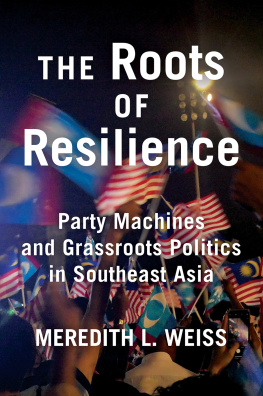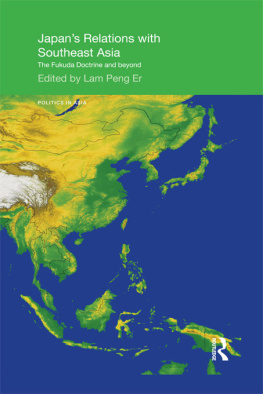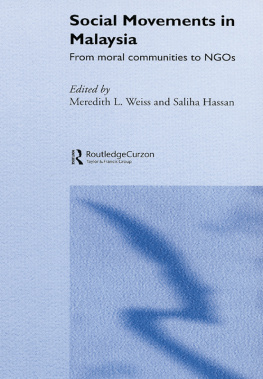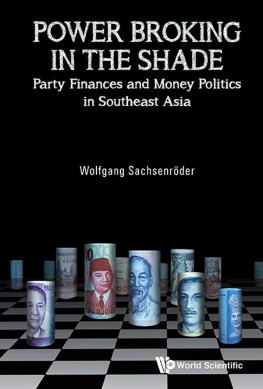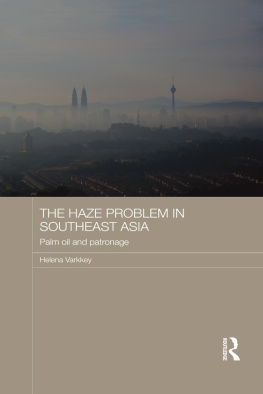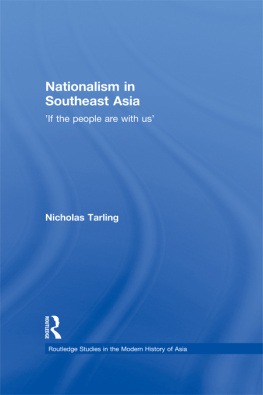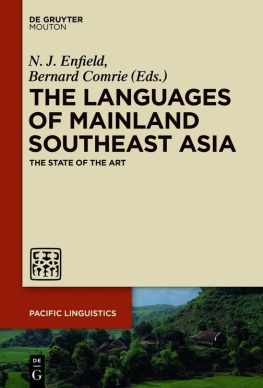Acknowledgments
This book complements a comparative analysis of political networks and resource flows in the context of Southeast Asian elections, together with co-investigators Edward Aspinall, Allen Hicken, and Paul Hutchcroft. Primary funding for that project, which has overlapped with this one, has been from the Australian Research Council (DP140103114), supplemented for Malaysias 2013 general election by a grant from Universiti Malaya, in collaboration with Edmund Terence Gomez and Surin Kaur. The University at Albany provided additional funds, particularly for my research in Singapore. I benefited immensely, as well, from time and space to think and write at the Australian National Universitys Coral Bell School of Asia Pacific Affairs in 2016 and Kyoto Universitys Center for Southeast Asian Studies in 2017, as well as from visiting stints for research at the Institute of Southeast Asian Studies (ISEASYusuf Ishak Institute) in Singapore and Universiti Kebangsaan Malaysias Institute of Malaysian and International Studies (IKMAS).
More difficult to specify are the extensive personal debts this project has incurred. I am immensely grateful to the scores of current and former legislators, local councilors, and activists who agreed to interviews or allowed me to shadow them or observe constituency eventsthis research would simply not have been possible had they been less forthcoming. Moreover, I learned so much from these interviews; these discussions confirmed my respect for the incredible dedication, thoughtfulness, and self-reflection of these extraordinarily hardworking public servants. (A note on how I cite those interviews: at key pointsfor instance, in describing the extent or character of constituency-outreachI cite in blocs. Those who requested anonymity are identified only by party. My objective has been to balance research transparency with respect for my sources.) I cannot list all interviewees here, but especial thanks to those who seemed always ready to meet, chat, and share contacts and insights unreservedlywho were more sounding boards than mere respondents. In alphabetical order (and painfully aware that I will surely forget to mention someone), these individuals include Tian Chua, Daniel Goh, Kenneth Jeyaretnam, Liew Chin Tong, Bryan Lim, Ong Kian Ming, Janil Puthucheary, Saifuddin Abdullah, Sim Tze Tsin, John Tan, and Wan Saiful Wan Jan.
Then there are the many others, some of them overlapping the first category, who helped to facilitate those meetings, a significant share of which would not have happened without a personal plug or referral, and/or helped out in other wayswith feedback, ideas, criticism, and more. This list is a very long one; I could not name everyone if I tried. Among the friends and colleagues most central to the fact of my completing this book and disentangling the ideas in it arebeyond Ed, Allen, and Paul, mentioned aboveAnna Har particularly (and her mother), Eileena Lee, Idzuafi Hadi Kamilan, Andrew Aeria, Terence Chong, Chong Ton Sin, Chua Beng Huat, Luenne Chua, Faisal Hazis, Terence Gomez, Francis Hutchinson, Suzaina Kadir, Surin Kaur, Sharaad Kuttan, Lee Hwok Aun, Joe Liow, Francis Loh, Loke Hoe Yeong, Sumit Mandal, Ngu Ik Tien, Ooi Kee Beng, Arnold Puyok, Mush Ridzwan, Ben Suffian, tan beng hui, Tan Seng Keat, Wong Chin Huat, and Kean Wong. Outside Southeast Asia (at least at the time), Thanet Apornsuvan, Coeli Barry, Ward Berenschot, Cheng Chen, Andrew Chin, John Funston, Eva Hansson, Carol Hau, Erik Kuhonta, Marcus Mietzner, Joan Nellhaus, Alysson Oakley, Michael Ong, Ayame Suzuki, and Ross Tapsell have been especially key.
And the debts mount still. Yuko Kasuya volunteered herself for the amazingly helpful service of organizing a book workshop at Keio University; not only was the feedback I received there truly valuable, but I would likely still be drafting chapters today if not for having had that looming deadline. I am deeply grateful to my workshop discussantsKhoo Boo Teik, Nathan Quimpo, and Ed Aspinallas well as those who attended and offered feedback, especially Mike Montesano, Hidekuni Washida, and Yuko herself. Loke Hoe Yeong and Faisal Haziss read-throughs saved me from what could otherwise have been some truly embarrassing errors; Ooi Kee Beng likewise did a nerves-calming review on short notice. My thanks, too, to the Politics and History Workshop in my own department and to my colleagues who read and not only offered great comments, but also lent confidence that someone beyond Southeast Asianists might find these arguments of interest. Audiences at a series of talks on the project over the years offered excellent feedback, including at the Australian National University, Griffith University, Johns HopkinsSAIS, ISEAS, Universiti Kebangsaan Malaysia, Kyoto University, the University of London (SOAS), Universiti Malaysia Sarawak, Northern Illinois University, and the University of Texas at Austin. Of course, the book would likely not be a bookand certainly would be far weakerif not for Cornells exceptionally encouraging and constructive reviewers, as well as Roger Haydon and the CUP staff. What faults remain are, of course, all my own.
Then there are all those people who have helped temper the inevitable weirdness of academic life, and especially a chronically peripatetic, jet-lagged version thereof. Particular thanks to Ruth Burdick, of course, as well as to Doug Tookey, Erin Shawn, Winifred Amaturo, Andy Rich, Joel Allen, Barry Trachtenburg, Jennifer Greiman, Harley Trachtenburg, Lynn Foley, Erszbet Fazekas, and Glenn Flanagan. Last, thanks to my Dad, who never seems to mind if I pretty much only call from airports (though granted, there are a lot of airports)!

